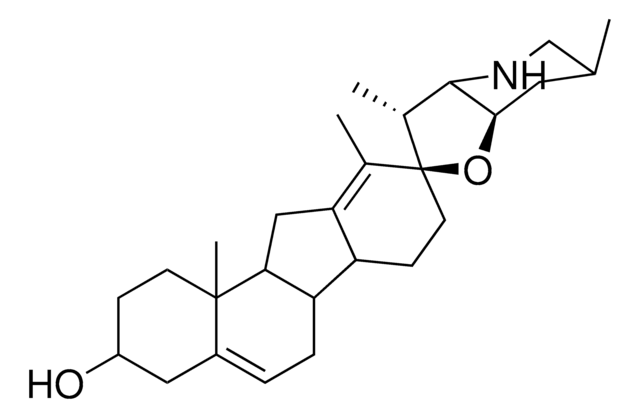239803
Cyclopamine
from Veratrum californicum, ≥97% (HPLC), solid, Sonic Hedgehog signaling antagonist, Calbiochem®
Synonym(s):
Cyclopamine, V. californicum
About This Item
Recommended Products
product name
Cyclopamine, V. californicum, Cyclopamine, V. californicum, CAS 4449-51-8, is a cell-permeable steroidal alkaloid & cholesterol mimic that specifically antagonizes Sonic Hedgehog signaling through direct interaction with Smo.
Quality Level
Assay
≥97% (HPLC)
form
solid
potency
20 nM IC50
manufacturer/tradename
Calbiochem®
storage condition
OK to freeze
protect from light
color
off-white
solubility
DMF: 10 mg/mL
DMSO: 4 mg/mL
ethanol: 5 mg/mL
shipped in
wet ice
storage temp.
−20°C
InChI
1S/C27H41NO2/c1-15-11-24-25(28-14-15)17(3)27(30-24)10-8-20-21-6-5-18-12-19(29)7-9-26(18,4)23(21)13-22(20)16(27)2/h5,15,17,19-21,23-25,28-29H,6-14H2,1-4H3/t15-,17+,19-,20-,21-,23-,24+,25-,26-,27-/m0/s1
InChI key
QASFUMOKHFSJGL-LAFRSMQTSA-N
General description
Biochem/physiol Actions
Hh signaling in Shh-light2 assay
Warning
Preparation Note
Reconstitution
Other Notes
Thayer, S.P., et al. 2003. Nature,425, 851.
Watkins, D.N., et al. 2003. Nature422, 313.
Chen, J.K., et al. 2002. Proc. Natl. Acad. Sci. USA99, 14071.
Berman, D.M., et al. 2002. Science297, 1559.
Taipale, J., et al. 2000. Nature406, 1005.
Kim, S.K., and Melton, D.A. 1998. Proc. Natl. Acad. Sci. USA95, 13036.
Cooper, M.K., et al. 1998. Science280, 1603.
Incardona, J.P., et al. 1998. Development125, 3553.
Legal Information
Signal Word
Danger
Hazard Statements
Precautionary Statements
Hazard Classifications
Acute Tox. 3 Oral - Repr. 1B
Storage Class Code
6.1C - Combustible acute toxic Cat.3 / toxic compounds or compounds which causing chronic effects
WGK
WGK 3
Flash Point(F)
Not applicable
Flash Point(C)
Not applicable
Certificates of Analysis (COA)
Search for Certificates of Analysis (COA) by entering the products Lot/Batch Number. Lot and Batch Numbers can be found on a product’s label following the words ‘Lot’ or ‘Batch’.
Already Own This Product?
Find documentation for the products that you have recently purchased in the Document Library.
Our team of scientists has experience in all areas of research including Life Science, Material Science, Chemical Synthesis, Chromatography, Analytical and many others.
Contact Technical Service









